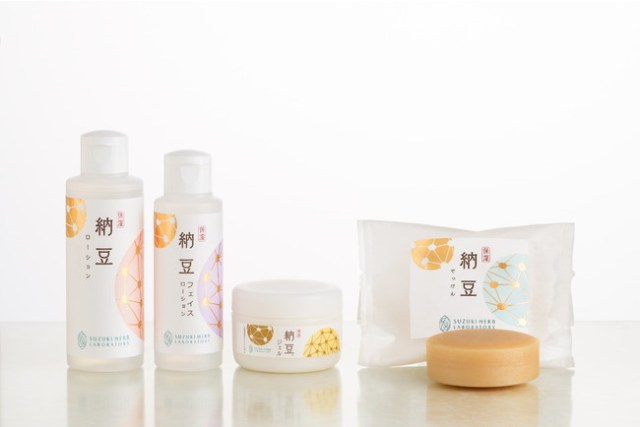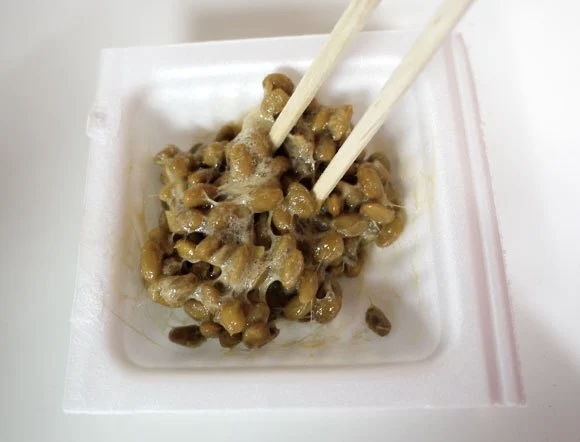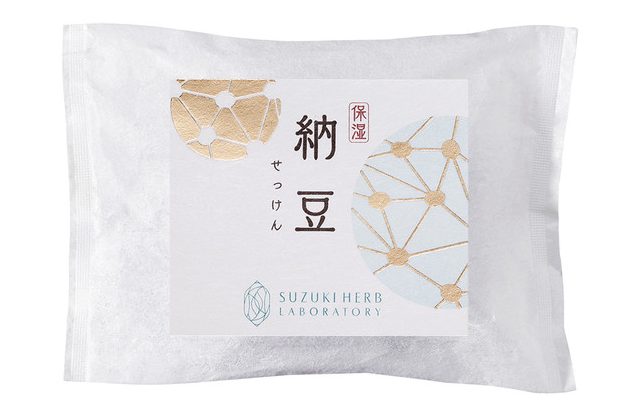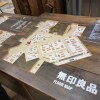
Make your skin as fresh as a styrofoam tub of fermented beans!
Many people are not too crazy about the fermented soy beans known as “natto” in Japan, what with their aged-cheese-like smell. For me, however, it’s the texture that makes me want to gag every time, with a fibrous sliminess similar to okra or yamaimo, and an overall mouthfeel of regurgitated beetles.

And yet despite the revulsion that feeling creates in my mouth, I could see that very same texture working very well as a lotion or soap. So a new line of soaps made with natto-derived ingredients and aptly named Natto, makes a lot of sense.
Of course, none of these products will leave you smelling like natto because the chemicals responsible for that notorious scent are not included in Natto. Instead the products are all based on polyglutamic acid, which is the substance responsible for natto’s stringy goo.
▼ Natto Face Soap
Natto also includes “natto gum,” a substance which also goes by the name “shokubutsusei collagen” or “vegetable collagen”. Vegetables don’t actually contain collagen and neither does natto, but natto gum is given that nickname because its effect on moisturizing skin is said to rival that of actual collagen.
There’s a bunch of other good stuff in Natto as well, such as fermented soy milk liquid, hyaluronic acid, and even the extract of natto’s gooey cousin okra. It comes in four forms: Natto Face Soap, Natto Body Lotion, Natto Face Lotion, and Natto Gel.
▼ Natto Gel
In addition to the smell, these items differ from real natto in that they do not leave a sticky feeling and penetrate deep into the skin for effective moisturization. The Natto line is made by Suzuki Herb Laboratory in Tokai Village, Ibaraki Prefecture, which is famous in Japan as a leading producer of natto and takes great pride in it. The products were developed a few years ago and mostly sold locally or through the Suzuki Herb Laboratory website.
▼ Suzuki Herb Laboratory
But for one day only they will also be sold at the Ibaraki Sense store in the Ginza area of Chuo, Tokyo on 17 July. It’s surprising they didn’t choose the previous Sunday of 10 July, which is frequently referred to as Natto Day because the numbers “7” and “10” together can kind of be read as “na-to.”
It seems that even the most sacred day of natto can’t beat the foot traffic of a long weekend, but don’t let that stop you from slathering on some of the amazingly healthy effects of natto on your skin. Even though you’ll never catch me eating it, I’m more than willing to give it a try on these sunburns I’ve been nursing.
Source: PR Times
Images: PR Times (Unless otherise noted)
● Want to hear about SoraNews24’s latest articles as soon as they’re published? Follow us on Facebook and Twitter!




 Adorable Totoro acorn key holders come with a special guest hidden inside[Photos]
Adorable Totoro acorn key holders come with a special guest hidden inside[Photos] Foreign tourists in Japan will get free Shinkansen tickets to promote regional tourism
Foreign tourists in Japan will get free Shinkansen tickets to promote regional tourism Highest Starbucks in Japan set to open this spring in the Tokyo sky
Highest Starbucks in Japan set to open this spring in the Tokyo sky “Let’s Speak North Korean!”
“Let’s Speak North Korean!” The world’s biggest Muji store opened in Hiroshima, and we went to check it out!
The world’s biggest Muji store opened in Hiroshima, and we went to check it out! Adorable Totoro acorn key holders come with a special guest hidden inside[Photos]
Adorable Totoro acorn key holders come with a special guest hidden inside[Photos] Foreign tourists in Japan will get free Shinkansen tickets to promote regional tourism
Foreign tourists in Japan will get free Shinkansen tickets to promote regional tourism Highest Starbucks in Japan set to open this spring in the Tokyo sky
Highest Starbucks in Japan set to open this spring in the Tokyo sky “Let’s Speak North Korean!”
“Let’s Speak North Korean!” The world’s biggest Muji store opened in Hiroshima, and we went to check it out!
The world’s biggest Muji store opened in Hiroshima, and we went to check it out! Giant Clodsire Pokémon plushie comes with up to 32 Woopers in super size, super cute set【Pics】
Giant Clodsire Pokémon plushie comes with up to 32 Woopers in super size, super cute set【Pics】 Saitama is home to the best strawberries in Japan that you’ve probably never even heard of
Saitama is home to the best strawberries in Japan that you’ve probably never even heard of Internet survey sheds light on how Japanese women deal with the hair ‘down there’
Internet survey sheds light on how Japanese women deal with the hair ‘down there’ Shizuoka hot springs town invites you to see one of the longest hina doll displays in Japan
Shizuoka hot springs town invites you to see one of the longest hina doll displays in Japan Want to wear a student uniform to Tokyo Disneyland? Uniform rental shop opens just outside park
Want to wear a student uniform to Tokyo Disneyland? Uniform rental shop opens just outside park The 10 most annoying things foreign tourists do on Japanese trains, according to locals
The 10 most annoying things foreign tourists do on Japanese trains, according to locals Starbucks Japan releases new sakura goods and drinkware for cherry blossom season 2026
Starbucks Japan releases new sakura goods and drinkware for cherry blossom season 2026 Naruto and Converse team up for new line of shinobi sneakers[Photos]
Naruto and Converse team up for new line of shinobi sneakers[Photos] Is Sapporio’s Snow Festival awesome enough to be worth visiting even if you hate the snow? [Pics]
Is Sapporio’s Snow Festival awesome enough to be worth visiting even if you hate the snow? [Pics] Japan has trams that say “sorry” while they ride around town…but why?
Japan has trams that say “sorry” while they ride around town…but why? Tokyo Skytree turns pink for the cherry blossom season
Tokyo Skytree turns pink for the cherry blossom season Sakura Totoro is here to get spring started early with adorable pouches and plushies
Sakura Totoro is here to get spring started early with adorable pouches and plushies Poop is in full bloom at the Unko Museums for cherry blossom season
Poop is in full bloom at the Unko Museums for cherry blossom season Shibuya Station’s Hachiko Gate and Yamanote Line stairway locations change next month
Shibuya Station’s Hachiko Gate and Yamanote Line stairway locations change next month Japan’s new “Cunte” contact lenses aren’t pronounced like you’re probably thinking they are
Japan’s new “Cunte” contact lenses aren’t pronounced like you’re probably thinking they are Japan’s newest Shinkansen has no seats…or passengers [Video]
Japan’s newest Shinkansen has no seats…or passengers [Video] Foreigners accounting for over 80 percent of off-course skiers needing rescue in Japan’s Hokkaido
Foreigners accounting for over 80 percent of off-course skiers needing rescue in Japan’s Hokkaido Super-salty pizza sends six kids to the hospital in Japan, linguistics blamed
Super-salty pizza sends six kids to the hospital in Japan, linguistics blamed Starbucks Japan unveils new sakura Frappuccino for cherry blossom season 2026
Starbucks Japan unveils new sakura Frappuccino for cherry blossom season 2026 Take a trip to Japan’s Dododo Land, the most irritating place on Earth
Take a trip to Japan’s Dododo Land, the most irritating place on Earth Is China’s don’t-go-to-Japan warning affecting the lines at a popular Tokyo gyukatsu restaurant?
Is China’s don’t-go-to-Japan warning affecting the lines at a popular Tokyo gyukatsu restaurant? Survey asks foreign tourists what bothered them in Japan, more than half gave same answer
Survey asks foreign tourists what bothered them in Japan, more than half gave same answer Japan’s human washing machines will go on sale to general public, demos to be held in Tokyo
Japan’s human washing machines will go on sale to general public, demos to be held in Tokyo Starbucks Japan releases new drinkware and goods for Valentine’s Day
Starbucks Japan releases new drinkware and goods for Valentine’s Day We deeply regret going into this tunnel on our walk in the mountains of Japan
We deeply regret going into this tunnel on our walk in the mountains of Japan Studio Ghibli releases Kodama forest spirits from Princess Mononoke to light up your home
Studio Ghibli releases Kodama forest spirits from Princess Mononoke to light up your home Major Japanese hotel chain says reservations via overseas booking sites may not be valid
Major Japanese hotel chain says reservations via overseas booking sites may not be valid Put sesame oil in your coffee? Japanese maker says it’s the best way to start your day【Taste test】
Put sesame oil in your coffee? Japanese maker says it’s the best way to start your day【Taste test】 No more using real katana for tourism activities, Japan’s National Police Agency says
No more using real katana for tourism activities, Japan’s National Police Agency says Giant Clodsire Pokémon plushie comes with up to 32 Woopers in super size, super cute set【Pics】
Giant Clodsire Pokémon plushie comes with up to 32 Woopers in super size, super cute set【Pics】 Saitama is home to the best strawberries in Japan that you’ve probably never even heard of
Saitama is home to the best strawberries in Japan that you’ve probably never even heard of Internet survey sheds light on how Japanese women deal with the hair ‘down there’
Internet survey sheds light on how Japanese women deal with the hair ‘down there’ Shizuoka hot springs town invites you to see one of the longest hina doll displays in Japan
Shizuoka hot springs town invites you to see one of the longest hina doll displays in Japan Want to wear a student uniform to Tokyo Disneyland? Uniform rental shop opens just outside park
Want to wear a student uniform to Tokyo Disneyland? Uniform rental shop opens just outside park Consumer Reports: Do these workout shirts really show too much nipple?
Consumer Reports: Do these workout shirts really show too much nipple? Starbucks Japan unveils new Sakura Frappuccino for cherry blossom season 2025
Starbucks Japan unveils new Sakura Frappuccino for cherry blossom season 2025 Tokyo Skytree turns pink for the cherry blossom season
Tokyo Skytree turns pink for the cherry blossom season Tokyo considering law requiring more trash cans following litter increase in heavily touristed area
Tokyo considering law requiring more trash cans following litter increase in heavily touristed area Survey finds that one in five high schoolers don’t know who music legend Masaharu Fukuyama is
Survey finds that one in five high schoolers don’t know who music legend Masaharu Fukuyama is Life-size Mewtwo, graffiti Pikachu welcome us to the newest Pokémon Center megastore in Shibuya
Life-size Mewtwo, graffiti Pikachu welcome us to the newest Pokémon Center megastore in Shibuya Uniqlo reveals first-ever T-shirt collaboration with Your Name anime director Makoto Shinkai
Uniqlo reveals first-ever T-shirt collaboration with Your Name anime director Makoto Shinkai Illustrator creates beautiful “Bicycle Boy” watercolour series inspired by Studio Ghibli
Illustrator creates beautiful “Bicycle Boy” watercolour series inspired by Studio Ghibli These fan-drawn fused Pokémon are so cool we wish they were really in the game
These fan-drawn fused Pokémon are so cool we wish they were really in the game